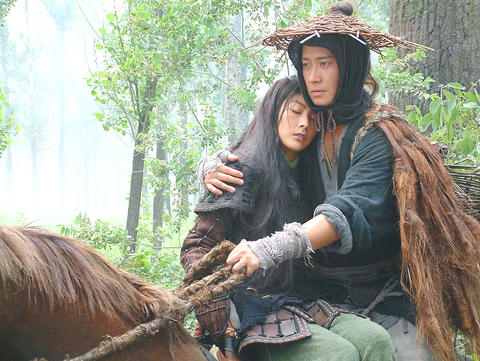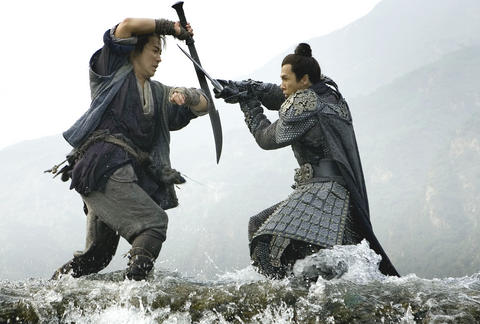Hong Kong filmmaker Tony Ching Siu-tung, (程小東) the world-renowned action movie choreographer who made Hero (英雄), House of Flying Daggers (十面埋伏) and most recently The Warlords (投名狀), returns to the director's chair for another big-budget Chinese martial arts epic, An Empress and the Warriors (江山美人).
Set during the turbulent Warring States Period during which regional warlords fought to consolidate their rule, the film begins as the Kingdom of Yan battles for survival against the Kingdom of Zhao. Unbeknown to anyone, the Yan monarch is murdered on the battlefield by his nephew Wu Ba (played by Guo Xiaodong, 郭曉冬), who covets the throne.
Much to the disappointment of Wu and his faction, general Hu (played by Donnie Yen, 甄子丹) is declared successor. Worrying that civil war will break out if he becomes the new king, Hu prudently crowns the late ruler's only child, Princess Feier (played by Kelly Chen, 陳慧琳), with whom he has secretly been in love with since childhood.

PHOTO: COURTESY OF POWER GROUP
The warrior princess is wounded when Wu tries to bump her off and is saved by the charming forest hermit Duan Lanquan (played by Leon Lai, 黎明). Romance quickly ensues. But the time comes when the princess must choose between a happy-ever-after life with her lover and duty.
With a straightforward storyline driven by tight editing, the movie plays nicely against a melodious soundtrack but is hardly a groundbreaking picture. It does have elaborate art direction and an eye-pleasing cast of stars.
From imposing warfare to duels, the fight sequences eloquently summarize what Ching has accomplished in the past decade. On the romance front, the melodramatic plot is told using fairytale scenes and even includes a flying machine powered by hot air.

PHOTO: COURTESY OF POWER GROUP
Romance and action in turns keep the audience engaged. Parts of the story are reminiscent of the Ching-esque martial arts romanticism in A Chinese Ghost Story (倩女幽魂) and Swordsman (笑傲江湖).
Ching's cinema often highlights strong female roles, but in this movie, the princess is also the vehicle of a simplistic and easy-to-digest anti-war message.
Singer-actress Chen is passable as a woman thrust into the militant world of men who leads her country to peace, while the slightly aged Lai is a poised, if not poker-faced, swordsman.
Surprisingly, Yen emerges as the strongest character of the film: a lovable, lovelorn man much more complex than a mere fighting machine. Nevertheless, as beautifully choreographed fight scenes tailor-made for Yen are expected highlights of the film, the action star has plenty of screen time to indulge audiences with his martial artistry, adding a tragic grandeur to the film in the finale that sees the lone hero taking on the world.
A highly entertaining mixture of romance, action and battle scenes, the film has the slick, crowd-pulling looks to become a blockbuster that offers a 90 minute escape.

Every now and then, it’s nice to just point somewhere on a map and head out with no plan. In Taiwan, where convenience reigns, food options are plentiful and people are generally friendly and helpful, this type of trip is that much easier to pull off. One day last November, a spur-of-the-moment day hike in the hills of Chiayi County turned into a surprisingly memorable experience that impressed on me once again how fortunate we all are to call this island home. The scenery I walked through that day — a mix of forest and farms reaching up into the clouds

With one week left until election day, the drama is high in the race for the Chinese Nationalist Party (KMT) chair. The race is still potentially wide open between the three frontrunners. The most accurate poll is done by Apollo Survey & Research Co (艾普羅民調公司), which was conducted a week and a half ago with two-thirds of the respondents party members, who are the only ones eligible to vote. For details on the candidates, check the Oct. 4 edition of this column, “A look at the KMT chair candidates” on page 12. The popular frontrunner was 56-year-old Cheng Li-wun (鄭麗文)

“How China Threatens to Force Taiwan Into a Total Blackout” screamed a Wall Street Journal (WSJ) headline last week, yet another of the endless clickbait examples of the energy threat via blockade that doesn’t exist. Since the headline is recycled, I will recycle the rebuttal: once industrial power demand collapses (there’s a blockade so trade is gone, remember?) “a handful of shops and factories could run for months on coal and renewables, as Ko Yun-ling (柯昀伶) and Chao Chia-wei (趙家緯) pointed out in a piece at Taiwan Insight earlier this year.” Sadly, the existence of these facts will not stop the

Oct. 13 to Oct. 19 When ordered to resign from her teaching position in June 1928 due to her husband’s anti-colonial activities, Lin Shih-hao (林氏好) refused to back down. The next day, she still showed up at Tainan Second Preschool, where she was warned that she would be fired if she didn’t comply. Lin continued to ignore the orders and was eventually let go without severance — even losing her pay for that month. Rather than despairing, she found a non-government job and even joined her husband Lu Ping-ting’s (盧丙丁) non-violent resistance and labor rights movements. When the government’s 1931 crackdown